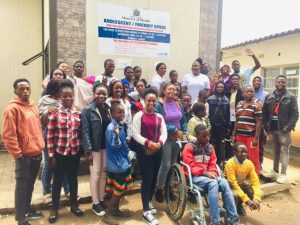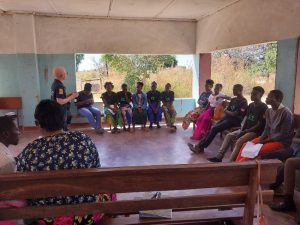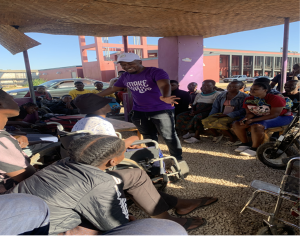Advancing Access to Sexual and Reproductive Health Services: Make Way Program Breaks Barriers in Zambia
 29 February 2024
29 February 2024
In a concerted effort to address longstanding challenges in sexual and reproductive health (SRH) access, five organizations are implementing the Make Way Program in Zambia.
The Forum for African Women Educationalists in Zambia (FAWEZA), Cheshire Home Society of Zambia (CHSZ), VSO, Akina Mama wa Afrika (AMwA), and the Circle of Concerned African Women Theologians (CIRCLE) have teamed up to pragmatically address issues hindering accessibility.
The Make Way program’s implementing organizations
Cheshire Home Society of Zambia with support from Liliane Fonds work closely with collaborating partners as Group Focused Consultation, Advocacy on Human Development and Zambia Federation of Disability Organisation. Under Cheshire Home society of Zambia with its collaborating partners are implementing the Make Way Programme in selected districts of Zambia, namely Mansa, Mufulira and Lusaka.
In Mansa district the project is being implemented by Groups Focused Consultations, Lusaka by Zambia Federation of disability Organization and Mufulira by Advocacy on human Development in collaboration with Ministry of Health.
Aligning with global goals
It is often stated that integrating human rights in sexual and reproductive health (SRH) policies, programs and services is essential to achieving the 2030 Agenda for Sustainable Development. Sustainable Development Goal (SDG) 3 “Ensure healthy lives and promote well-being for all at all ages” and SDG 5 “Achieve gender equality and empower all women and girls” both include targets that call for universal access to SRH services and realization of SRH rights.
Navigating the complex interplay
The complex interplay of rights-related factors generally recognized to impact SRH outcomes that includes the availability, accessibility, acceptability and quality of health services.

SRH-related outcomes are all further helped or hindered by the unique legal and policy environment and the larger economic, social, cultural and political determinants of local contexts, including the presence or absence of accessible and functional accountability mechanisms. Attention to all these components forms part of what is considered a rights-based approach to SRH.
Breaking down access barriers
Young people with compounded vulnerabilities has not been an exception to the lack of access to sexual and reproductive health services compelled by inadequate and distant health facilities, personnel, inaccessible health infrastructure, negative attitudes from families, communities and through to health facilities and systems. The coming of the Make-Way project has proved to contribute to breaking barriers to access SRH services for youths with compounded vulnerabilities.

Cheshire Home Society of Zambia with its collaborating partners through the Make-Way Project embarked on establishing both inclusive and exclusive safe spaces through a human rights approach in Lusaka, Luapula and Copper-belt province, aimed at empowering young people with SRHR information as well advocating for available, accessible and quality SRH marginalized populations.
Defining safe spaces
From the definition under the Make way, “safe space” refers to a physical or digital context where people can express their views, needs and opinions and non-judgmentally and respectfully enter into dialogue with each other. Safe spaces are a space where people can trust they will not be exposed to discrimination, harassment, or any other emotional, psychological or physical harm.

Transformative impact
It is through the Make-Way program that young people with compounded vulnerabilities in the selected implementing sites in Lusaka, Mufulira and Mansa. They have been able to take part in the safe spaces’ meetings. Young with compounded vulnerabilities empowered with information on sexual reproductive and health rights as well as to joined the wagon of advocates of intersectional sexual reproductive health services. The exclusive safe spaces provide a unique opportunity for young people sharing similar vulnerabilities to share their challenges before entering the inclusive main safe spaces at health facilities.
”As young people with Disabilities in Matero constituency of Lusaka Zambia, we used to have challenges with accessing SRH services and other health service, but after learning from the safe space we are able to go to the health facility to enquire and access different sexual reproductive health services as well as to participate in the safe space meetings. We do not only participate at the youth safe space at the facility but we are able to participate in community programs by raising awareness on disabilities and sexual reproductive health services, this is because there are many young people with disabilities who do not know about sexual reproductive health services.” – Mwiza Banda.



